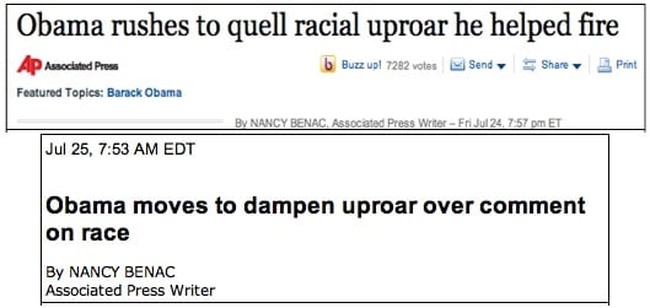My beloved, eternally bumbling Chicago Cubs swept the even lowlier Washington Nationals in a three-game mid-July series. I read that in an Associated Press report headlined “Big 4th inning gives Cubs sweep of Nationals.”
Will reporting this result to readers get me in trouble someday soon?
That result isn’t as far-fetched as you might think.
On July 23, the AP, that empire of alleged journalism that characterizes itself as “The Essential Global News Network,” signaled its intention to fundamentally change its relationship with the rest of the online world:
As part of a strategy approved Thursday by the AP’s board, the cooperative will start by bundling its text stories in an “informational wrapper” that will include a built-in beacon to monitor where stories go on the Internet.
The beacon is meant to be a policing device aimed at deterring websites from posting AP content without paying licensing fees. The AP and its member newspapers contend unlicensed use of their material is costing them tens of millions of dollars in potential ad revenue. …
“This is a pivotal step in the fight to ensure that quality journalism can be funded in the digital era,” Tom Curley, AP’s chief executive, said in an interview. “We have stood by too long and watched other people make money off the hard work of our journalists. We have decided to draw a line in concrete.”
The wire service expects to roll out the “informational wrapper” in stages beginning in November.
AP’s press release is troubling enough, but in a related New York Times interview that day with Richard Perez-Peña, AP’s Curley added this:
The company’s position was that even minimal use of a news article online required a licensing agreement with the news organization that produced it. … He specifically cited references that include a headline and a link to an article, a standard practice of search engines like Google, Bing, and Yahoo, news aggregators, and blogs.
Asked if that stance went further than the AP had gone before, he said, “That’s right.”
While AP’s aggressive posture is of course largely about money, it is also about control, accountability, and thin-skinned resistance to criticism. The only thing up for debate is the relative importance of each factor.
Of course, the money involved is a big deal. In its press release, AP cites a roughly 6.5% drop in revenue in 2008 from $748 million to $700 million. It expects another drop in 2009 because of reductions in fees charged to newspapers and broadcasters.
The wire service should consider itself lucky, because it is. While AP’s revenue declines are only a bit less than those seen at larger subscribing outlets such as the New York Times (down 7.6% in 2008) and Gannett (down 9%), problems further down the newspaper food chain are clearly much more serious. Click on the “Quarterly” tab at this Newspaper Association of America link (HT: Newsosaur), and you’ll see that total print advertising revenues in the first quarter of 2009 ($5.923 billion) were 36% lower than 1Q08 ($9.296 billion) and a shocking 55% lower than 1Q06 ($13.245 billion). In that context, it would seem that AP’s price breaks are nowhere near what its subscribers need to survive.
In fact, AP’s relative strength, and its ability to limit its fee reductions to far less than the revenue hits its subscribers are taking, are a result of its dominant, near-monopoly market position. Because of the steep decline in available resources and a worse crash in credibility during the past decade at the New York Times, AP reports now probably form the basis for the vast majority of most newspapers’ national news and a high plurality of their international news. AP reports very often serve as the starting point for top- and bottom-of-hour radio newscasts, and more than likely drive a large portion of the content of television news shows and newscasts. For breaking daily business news, the nation, heaven help us, is largely at AP’s mercy, where the economic narrative shaped by its fundamentally weak and insufferably biased reporters seems to insinuate itself everywhere.
Though the wire service has content licensing agreements with the major search engines and some aggregators, it currently only gains financially when visitors click through to AP or a subscribing affiliate. That’s not enough for Curley & Co. They want to get credit when a user only lands on the page containing a related search engine listing or, as noted above, arrives at a page with a mere headline — even if the user never actually looks at it.
In taking this position, the AP and Curley apparently believe that megasites like Matt Drudge, whose every linked headline drives hundreds of thousands if not occasionally millions of readers to their related stories, and who on his own provides ten links to the wire service that are visible 24-7-365, should be paying AP for the “privilege” of beefing up AP’s and its subscribers’ traffic, and even for every user who visits him. Charging Drudge, or a search engine, or anyone else, for a user who doesn’t click through is like making a store pay a nickel for every customer who walks by the newspaper rack, whether or not they even look, let alone buy.
Beyond that, AP seems to believe that blogs, forums, and other online outlets that link and excerpt its material (perhaps even emailers, texters, and Twitterers?) have no right to do so without compensating AP.
Of course, the AP’s position is economically ignorant, at least in the short term. There will be pushback from those who will refuse to link to AP. Others will likely figure out how to disable the wrapper, while still others will resort to likely wrapper-proof screen shots and area grabs.
If Curley & Co. were consistent, they would prevent web crawlers from indexing the wire service’s content. But that would require them to build a web business on their own. Fat chance of that.
AP’s astounding arrogance is intensely galling. These control freaks seem to believe that they not only own the news, but also that the news is only what they say it is and that you have to come to them to get it — or otherwise pay for the privilege.
Not so, guys. Of course, you own your content. Obviously, your content ownership proscribes outright pilferage. But in a free society, ownership of news content also comes with responsibilities. Those responsibilities include permitting the quality of your content to be critiqued, allowing your alleged facts and claims to be disputed and expanded upon, and putting up with documented criticisms of possibly biased reporting, along with the exposure of the possible sources of those biases. It also should allow readers to question why the tone of the stories changes in mid-stream, as exemplified by the headline change this past weekend in the Obama-Gates-Crowley affair even though there were no new story developments during the intervening period:

Curley & Co. do not recognize the legitimacy of what normal people refer to as “fair use” and are in fact seeking to narrow its scope to near nothingness.
Last year, AP’s legal bullies went after a leftist critique site called the Drudge Retort, telling it that even an excerpt as short as 33 words “does not fall within the parameters of fair use.” Though Curley would not discuss fair use with the Times, it’s clear that demanding money for listing mere headlines is a quantum leap beyond last year’s widely ridiculed exercise.
It would be one thing if there was anything resembling reciprocity, but the fact is that AP frequently scrapes news from blogs, and even its subscribers, without attribution. One small example: In the fall of 2007, yours truly and fellow PJMer Patrick Poole exposed the terror-sympathetic background of a Muslim cleric who was about to begin serving as imam at a Cleveland mosque. When the imam “resigned” before he even started and blamed “bloggers” for his demise, the AP parroted his whining and refused to name either of us. For that matter, the Cleveland Plain Dealer, for whom I was actually blogging at the time, also mostly ignored us. This is the same Plain Dealer whose “readers representative” recently stooped to calling bloggers “pipsqueaks.”
But credit, like content, is a one-way street in AP-land. As far as it’s concerned, once their reporters type it, they have absolute control over it and you can’t have any of it, even for perfectly legal reasons — unless you pay their toll. Do not rule out the possibility, especially given who is in charge in Washington, that they might succeed. Meanwhile, at least you’re reasonably up to date on how the Cubs are faring.









Join the conversation as a VIP Member